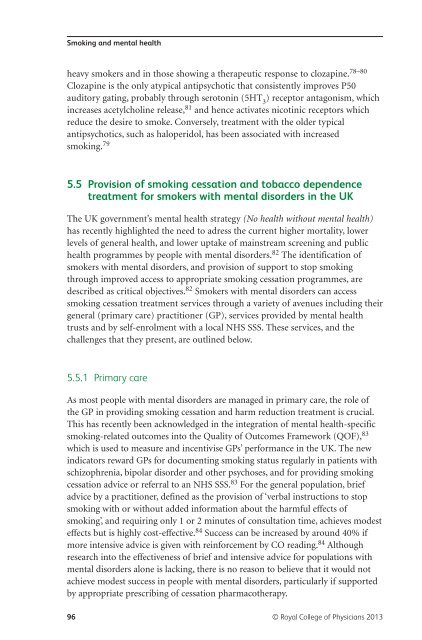Smoking and mental health - NCSCT
Smoking and mental health - NCSCT
Smoking and mental health - NCSCT
Create successful ePaper yourself
Turn your PDF publications into a flip-book with our unique Google optimized e-Paper software.
<strong>Smoking</strong> <strong>and</strong> <strong>mental</strong> <strong>health</strong><br />
heavy smokers <strong>and</strong> in those showing a therapeutic response to clozapine. 78–80<br />
Clozapine is the only atypical antipsychotic that consistently improves P50<br />
auditory gating, probably through serotonin (5HT 3<br />
) receptor antagonism, which<br />
increases acetylcholine release, 81 <strong>and</strong> hence activates nicotinic receptors which<br />
reduce the desire to smoke. Conversely, treatment with the older typical<br />
antipsychotics, such as haloperidol, has been associated with increased<br />
smoking. 79<br />
5.5 Provision of smoking cessation <strong>and</strong> tobacco dependence<br />
treatment for smokers with <strong>mental</strong> disorders in the UK<br />
The UK government’s <strong>mental</strong> <strong>health</strong> strategy (No <strong>health</strong> without <strong>mental</strong> <strong>health</strong>)<br />
has recently highlighted the need to adress the current higher mortality, lower<br />
levels of general <strong>health</strong>, <strong>and</strong> lower uptake of mainstream screening <strong>and</strong> public<br />
<strong>health</strong> programmes by people with <strong>mental</strong> disorders. 82 The identification of<br />
smokers with <strong>mental</strong> disorders, <strong>and</strong> provision of support to stop smoking<br />
through improved access to appropriate smoking cessation programmes, are<br />
described as critical objectives. 82 Smokers with <strong>mental</strong> disorders can access<br />
smoking cessation treatment services through a variety of avenues including their<br />
general (primary care) practitioner (GP), services provided by <strong>mental</strong> <strong>health</strong><br />
trusts <strong>and</strong> by self-enrolment with a local NHS SSS. These services, <strong>and</strong> the<br />
challenges that they present, are outlined below.<br />
5.5.1 Primary care<br />
As most people with <strong>mental</strong> disorders are managed in primary care, the role of<br />
the GP in providing smoking cessation <strong>and</strong> harm reduction treatment is crucial.<br />
This has recently been acknowledged in the integration of <strong>mental</strong> <strong>health</strong>-specific<br />
smoking-related outcomes into the Quality of Outcomes Framework (QOF), 83<br />
which is used to measure <strong>and</strong> incentivise GPs’ performance in the UK. The new<br />
indicators reward GPs for documenting smoking status regularly in patients with<br />
schizophrenia, bipolar disorder <strong>and</strong> other psychoses, <strong>and</strong> for providing smoking<br />
cessation advice or referral to an NHS SSS. 83 For the general population, brief<br />
advice by a practitioner, defined as the provision of ‘verbal instructions to stop<br />
smoking with or without added information about the harmful effects of<br />
smoking’, <strong>and</strong> requiring only 1 or 2 minutes of consultation time, achieves modest<br />
effects but is highly cost-effective. 84 Success can be increased by around 40% if<br />
more intensive advice is given with reinforcement by CO reading. 84 Although<br />
research into the effectiveness of brief <strong>and</strong> intensive advice for populations with<br />
<strong>mental</strong> disorders alone is lacking, there is no reason to believe that it would not<br />
achieve modest success in people with <strong>mental</strong> disorders, particularly if supported<br />
by appropriate prescribing of cessation pharmacotherapy.<br />
96 © Royal College of Physicians 2013














